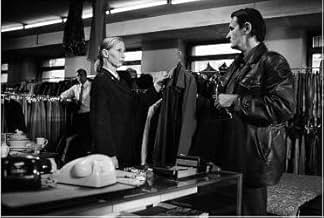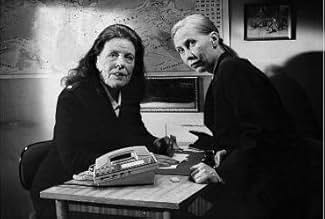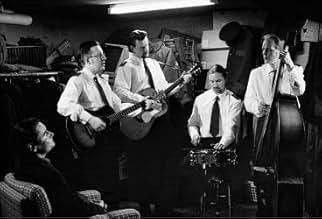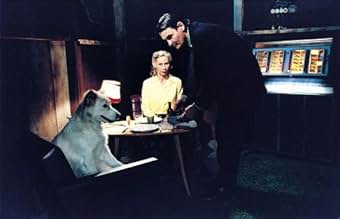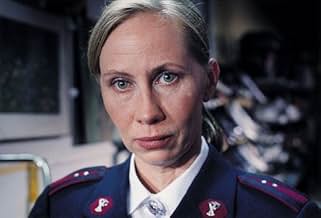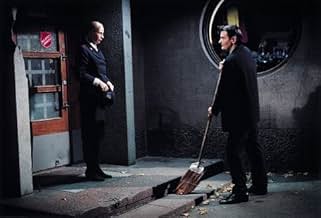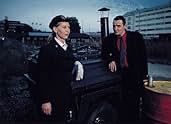AVALIAÇÃO DA IMDb
7,6/10
28 mil
SUA AVALIAÇÃO
M chega a Helsinque apenas para ser atacado por bandidos e declarado morto por médicos. Ele revive, mas sem memória de seu passado ou de sua identidade. Ele reconstrói sua vida a partir do z... Ler tudoM chega a Helsinque apenas para ser atacado por bandidos e declarado morto por médicos. Ele revive, mas sem memória de seu passado ou de sua identidade. Ele reconstrói sua vida a partir do zero, mas o passado inevitavelmente o alcança.M chega a Helsinque apenas para ser atacado por bandidos e declarado morto por médicos. Ele revive, mas sem memória de seu passado ou de sua identidade. Ele reconstrói sua vida a partir do zero, mas o passado inevitavelmente o alcança.
- Indicado a 1 Oscar
- 21 vitórias e 27 indicações no total
Avaliações em destaque
This film is about as fast paced as Finnish films get, I guess. Don't look for a lot of facial expressions and a lot of overt body language because you ain't gonna get it. The film moves slowly like a Saami joiking in the sauna but it wonderful to behold with each deliberate step it takes. The characters may seem a little stiff to those of us unfamiliar with the inscrutable Finns but the great Finnish reserve which overlays the story line is tweaking at our whiskers at every shuffle forward in the story. It is really amazing that we have not seen other Finnish works before. This kind of off-the-wall story which has a wonderful basis of humanity underneath the more real than life characters clustered around a site with little or no conveniences of modern living in their sea container households. The odyssey of M who wanders through his voyage in search of himself only to be reconciled not with his long suffering and long awaiting Penelope but with a frustrated but good-hearted Major Barbara.
There are lots of puns visual and otherwise with the threads of incompetent cops, doctors, nurses, employment office workers interwoven with a comical wannabe bad-guy overseer, a rock'n roll Salvation Army band, a torch-songstress SA Major and the philosophical hero who honestly can't remember.
Check this one out without fail. It's pure fun...but just don't expect it run along at breakneck speed ala Hollywood...!
There are lots of puns visual and otherwise with the threads of incompetent cops, doctors, nurses, employment office workers interwoven with a comical wannabe bad-guy overseer, a rock'n roll Salvation Army band, a torch-songstress SA Major and the philosophical hero who honestly can't remember.
Check this one out without fail. It's pure fun...but just don't expect it run along at breakneck speed ala Hollywood...!
Herzog introduced me to the tension created by moving back and forth from highly styled scenes to realistic ones in syncopated steps. It has an extraordinary effect; I do not know who first devised this technique, but it matters.
Sometimes, you will see it adding value on the real side. Rarely is it ever used this way, to multiply anchor a minimalist sketch of fate. Jarmusch does this, perhaps being the master, but this is pretty clean, novel and effective as well. Its because Fins are inherently minimalist in a particularly overt way. Stylized in a stylized way, perhaps to stand above its neighbors who value cleanliness but only after passing through terminal sophistication.
There is a sweet purity to this man we see, and the man we do not who made the thing. There is an honor in just getting up in the morning. The people here are either honest and generous — even the local cop who exploits the poor — or crippled participants in the machine. Everyone with a conventional job is in this latter class.
Just as with most Jarmusch, music and the enrichment it brings, is woven into the story as an intrinsic element. The music itself is highly stylized, and like the film is an abstraction of deep, rich emotion. It is played here by a Slavation Army band our hero brings to musical salvation. The love story matters I think, because it depends on nothing other than simple need and directness.
Ted's Evaluation -- 3 of 3: Worth watching.
Sometimes, you will see it adding value on the real side. Rarely is it ever used this way, to multiply anchor a minimalist sketch of fate. Jarmusch does this, perhaps being the master, but this is pretty clean, novel and effective as well. Its because Fins are inherently minimalist in a particularly overt way. Stylized in a stylized way, perhaps to stand above its neighbors who value cleanliness but only after passing through terminal sophistication.
There is a sweet purity to this man we see, and the man we do not who made the thing. There is an honor in just getting up in the morning. The people here are either honest and generous — even the local cop who exploits the poor — or crippled participants in the machine. Everyone with a conventional job is in this latter class.
Just as with most Jarmusch, music and the enrichment it brings, is woven into the story as an intrinsic element. The music itself is highly stylized, and like the film is an abstraction of deep, rich emotion. It is played here by a Slavation Army band our hero brings to musical salvation. The love story matters I think, because it depends on nothing other than simple need and directness.
Ted's Evaluation -- 3 of 3: Worth watching.
The Man Without a Past, the second installment in Aki Kaurismäki's "losers" trilogy (the first being 1996's Drifting Clouds), is, to date, the only Finnish film to have received a Best Foreign Language Film Oscar nomination, and deservedly so. It's a wonderful, heartbreaking opus, and arguably Kaurismäki's finest movie.
At the story's center we find a nameless man (Markku Peltola), who arrives in Helsinki for unknown reasons. That same night, he's brutally assaulted by a group of punks. This incident makes him look dead, although we immediately learn he is alive, if completely amnesiac. With no idea of who he is or what he's supposed to do, he starts looking for a home and an employment. He manages to rent a "house" in the city outskirts (don't miss Sakari Kuosmanen as the landlord) and befriends Irma (Kati Outinen), a social worker who tries to help M (in lack of a better name, and given "X" is quite overused) as much as possible. It is this friendship, which slowly evolves into something deeper, that truly motivates the protagonist in his pursuit of a better life.
The Man Without a Past strikes us because, unlike other films involving amnesia, it makes us hope M won't recover his memory: what he experiences throughout the movie, the people he meets, that's what really matters. It's a little bit like a road movie (they never end with the characters reaching their destination), only this time the voyage involves the mind and the spirit. It's a similar voyage the director asks the audience to join, as he artfully explores human life and its chances of improvement.
Moving and reminiscent of Italian neorealism (De Sica, Rossellini, Visconti), The Man Without a Past is a flawless reflection on how happiness is to be found anywhere, no matter the circumstances.
At the story's center we find a nameless man (Markku Peltola), who arrives in Helsinki for unknown reasons. That same night, he's brutally assaulted by a group of punks. This incident makes him look dead, although we immediately learn he is alive, if completely amnesiac. With no idea of who he is or what he's supposed to do, he starts looking for a home and an employment. He manages to rent a "house" in the city outskirts (don't miss Sakari Kuosmanen as the landlord) and befriends Irma (Kati Outinen), a social worker who tries to help M (in lack of a better name, and given "X" is quite overused) as much as possible. It is this friendship, which slowly evolves into something deeper, that truly motivates the protagonist in his pursuit of a better life.
The Man Without a Past strikes us because, unlike other films involving amnesia, it makes us hope M won't recover his memory: what he experiences throughout the movie, the people he meets, that's what really matters. It's a little bit like a road movie (they never end with the characters reaching their destination), only this time the voyage involves the mind and the spirit. It's a similar voyage the director asks the audience to join, as he artfully explores human life and its chances of improvement.
Moving and reminiscent of Italian neorealism (De Sica, Rossellini, Visconti), The Man Without a Past is a flawless reflection on how happiness is to be found anywhere, no matter the circumstances.
MAN WITHOUT A PAST, THE (Aki Kaurismäki - Finland/France/Germany 2002).
This second installment in Aki Kaurismaki's projected "Finland Trilogy" is a heart-warming fable about a man (Markku Peltola) who loses everything, including his identity. After M, as he is referred to for the rest of the film, dozes off on a park bench, he is awoken by a trio of thugs who brutally beat him up, steal his money and toss his wallet and identity papers into the trash bin. In the hospital, he is pronounced dead by the doctors, but by some miracle he springs back to life but with no memory whatsoever of his past or his identity. Now a penniless amnesiac, he has to build his life from scratch. Without knowing a single person (and without a single person knowing him), he must try to survive, but he soon acquires a melancholy dog named Hannibal and falls in love with Irma, a lonely salvation army soup kitchen volunteer. Of course, his past does catch up with him, but it only works to point out what's really important in his future life.
Kaurismäki usually champions the outcasts of society and here it's no different. He once said: "I make films for the unemployed, but since they don't have money to buy cinema tickets I generally have no audience." Of course, Kaurismäki has a huge audience by now, but no matter how simple and accessible the story in the film might look, he still manages to blend romance, quirky comedy and social commentary, seemingly effortless into the film's narrative.
Most of the humor doesn't come from any written gags or jokes but springs from the absurdity of the situations, all in Kaurismäki's typical deadpan-comedy style, complete with nods top '50s B-movies, rock'n'roll ("rhytm music", as it's called by M), fairytale romance and an incomparable soundtrack, featuring British beat combo, The Renegades. I just love the music in this film! Time and place hover between Helsinki in the '30s and the present. Despite the idiosyncratic set-up and the strange unreal dialog, it's incredible how very real all these characters feel. Deep sentiment but every inch of it sincere. I can't get enough of this film, no matter how often I've seen it.
Camera Obscura --- 9/10
This second installment in Aki Kaurismaki's projected "Finland Trilogy" is a heart-warming fable about a man (Markku Peltola) who loses everything, including his identity. After M, as he is referred to for the rest of the film, dozes off on a park bench, he is awoken by a trio of thugs who brutally beat him up, steal his money and toss his wallet and identity papers into the trash bin. In the hospital, he is pronounced dead by the doctors, but by some miracle he springs back to life but with no memory whatsoever of his past or his identity. Now a penniless amnesiac, he has to build his life from scratch. Without knowing a single person (and without a single person knowing him), he must try to survive, but he soon acquires a melancholy dog named Hannibal and falls in love with Irma, a lonely salvation army soup kitchen volunteer. Of course, his past does catch up with him, but it only works to point out what's really important in his future life.
Kaurismäki usually champions the outcasts of society and here it's no different. He once said: "I make films for the unemployed, but since they don't have money to buy cinema tickets I generally have no audience." Of course, Kaurismäki has a huge audience by now, but no matter how simple and accessible the story in the film might look, he still manages to blend romance, quirky comedy and social commentary, seemingly effortless into the film's narrative.
Most of the humor doesn't come from any written gags or jokes but springs from the absurdity of the situations, all in Kaurismäki's typical deadpan-comedy style, complete with nods top '50s B-movies, rock'n'roll ("rhytm music", as it's called by M), fairytale romance and an incomparable soundtrack, featuring British beat combo, The Renegades. I just love the music in this film! Time and place hover between Helsinki in the '30s and the present. Despite the idiosyncratic set-up and the strange unreal dialog, it's incredible how very real all these characters feel. Deep sentiment but every inch of it sincere. I can't get enough of this film, no matter how often I've seen it.
Camera Obscura --- 9/10
I've watched this twice now, and throughly enjoyed both viewings, finding this film to really be a unique one. It's a Finnish film, which is unusual to start with, at least here in the U.S. because we don't see too many films from Finland. It's a black comedy, meaning deadpan looks with subtle comedic lines. In English, it's titled "The Man Without A Past."
The main actor, Markuu Peltola, is perfect for this movie with one of the most deadpan faces you'll ever see. He is amazing to watch and Kati Outinen, as his love interest, is similarly strange and fascinating. Part of their charm are their unusual looks. This is not a romance between people who look like your normal handsome film stars.
Simply, this is just something very different from anything you've seen, a combination of drama, comedy and romance with some of the strangest dialog I've ever heard on film. If you appreciate dry humor and a bizarre but touching story, you should see this.
The main actor, Markuu Peltola, is perfect for this movie with one of the most deadpan faces you'll ever see. He is amazing to watch and Kati Outinen, as his love interest, is similarly strange and fascinating. Part of their charm are their unusual looks. This is not a romance between people who look like your normal handsome film stars.
Simply, this is just something very different from anything you've seen, a combination of drama, comedy and romance with some of the strangest dialog I've ever heard on film. If you appreciate dry humor and a bizarre but touching story, you should see this.
Você sabia?
- CuriosidadesIn the bar scene there is a portrait photo of Matti Pellonpää on the wall. He played in numerous Kaurismäki films before his sudden death in 1995.
- Erros de gravaçãoThe Helsinki railway station's extension roof is clearly visible at the opening scene, but it hadn't been built yet in 1996 (the year can be read from the newspaper).
- ConexõesFeatured in Matka suomalaiseen elokuvaan: Naurua pimeässä (2006)
- Trilhas sonorasDo The Shake
Performed by The Renegades
Music & Lyrics by Brown / Gibson / Johnson / Mallett
Published by Warner / Chappell Music Finland
(P) 1964 Scandia / Warner Music Finland
Licensed courtesy of Warner Music Finland
Principais escolhas
Faça login para avaliar e ver a lista de recomendações personalizadas
- How long is The Man Without a Past?Fornecido pela Alexa
Detalhes
- Data de lançamento
- Países de origem
- Centrais de atendimento oficiais
- Idioma
- Também conhecido como
- The Man Without a Past
- Locações de filme
- Empresas de produção
- Consulte mais créditos da empresa na IMDbPro
Bilheteria
- Orçamento
- FIM 8.000.000 (estimativa)
- Faturamento bruto nos EUA e Canadá
- US$ 921.847
- Fim de semana de estreia nos EUA e Canadá
- US$ 23.281
- 6 de abr. de 2003
- Faturamento bruto mundial
- US$ 9.564.237
- Tempo de duração1 hora 37 minutos
- Cor
- Mixagem de som
- Proporção
- 1.85 : 1
Contribua para esta página
Sugerir uma alteração ou adicionar conteúdo ausente

Principal brecha
What is the Canadian French language plot outline for O Homem Sem Passado (2002)?
Responda





